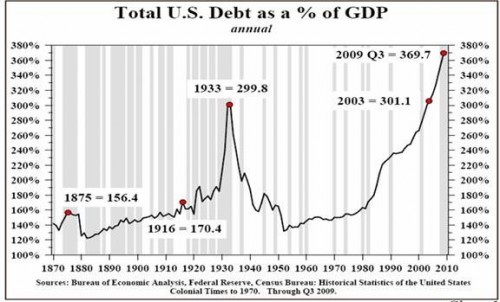I’ve never been a big fan of Donald Rumsfeld, but way back in 2002 he had a killer quote that expressed a great idea:
There are known knowns. These are things we know that we know. There are known unknowns. That is to say, there are things that we now know we don’t know. But there are also unknown unknowns. These are things we do not know we don’t know.
I love this quote but have always been frustrated by it. The ex-consultant in me thinks “you’ve only described three quadrants of a 2×2 matrix!” After all, what is an “unknown known”?
Today, I got an inkling of what that might be.
I was catching up on reading some John Mauldin Frontline Thoughts and noticed this graph:

John’s hypothesis is that we’re at the end of 60 year debt supercycle (1950-2010; preceded by 1880-1933) and it’s going to be a vicious delevering that’s going to reshape the world.
The interesting point in the graph below is where the kink upwards started: 1980, just a couple of years after I was born. Moreover, the damn line’s been going up pretty much ever since I’ve started thinking about things more complex than what to do after the school day ended.
And this brings me back to the unknown known. If John is correct (and I think he is), then everything I know about the world is tinged with the fact that I learned it going through the biggest credit bubble anyone alive has seen. A lot of the ‘facts’ I learned growing up (you’ll always be wealthier than your parents, social programs can be paid for, etc.) are going to be challenged over the next 30 years and I’m going to have to unlearn what I knew. My pattern recognition is going to be skewed because it was trained on a pretty crappy underlying dataset.
It won’t be easy, but now I think I finally know what a unknown known might be…